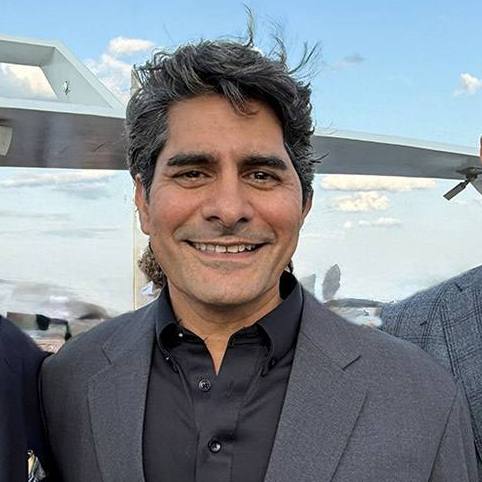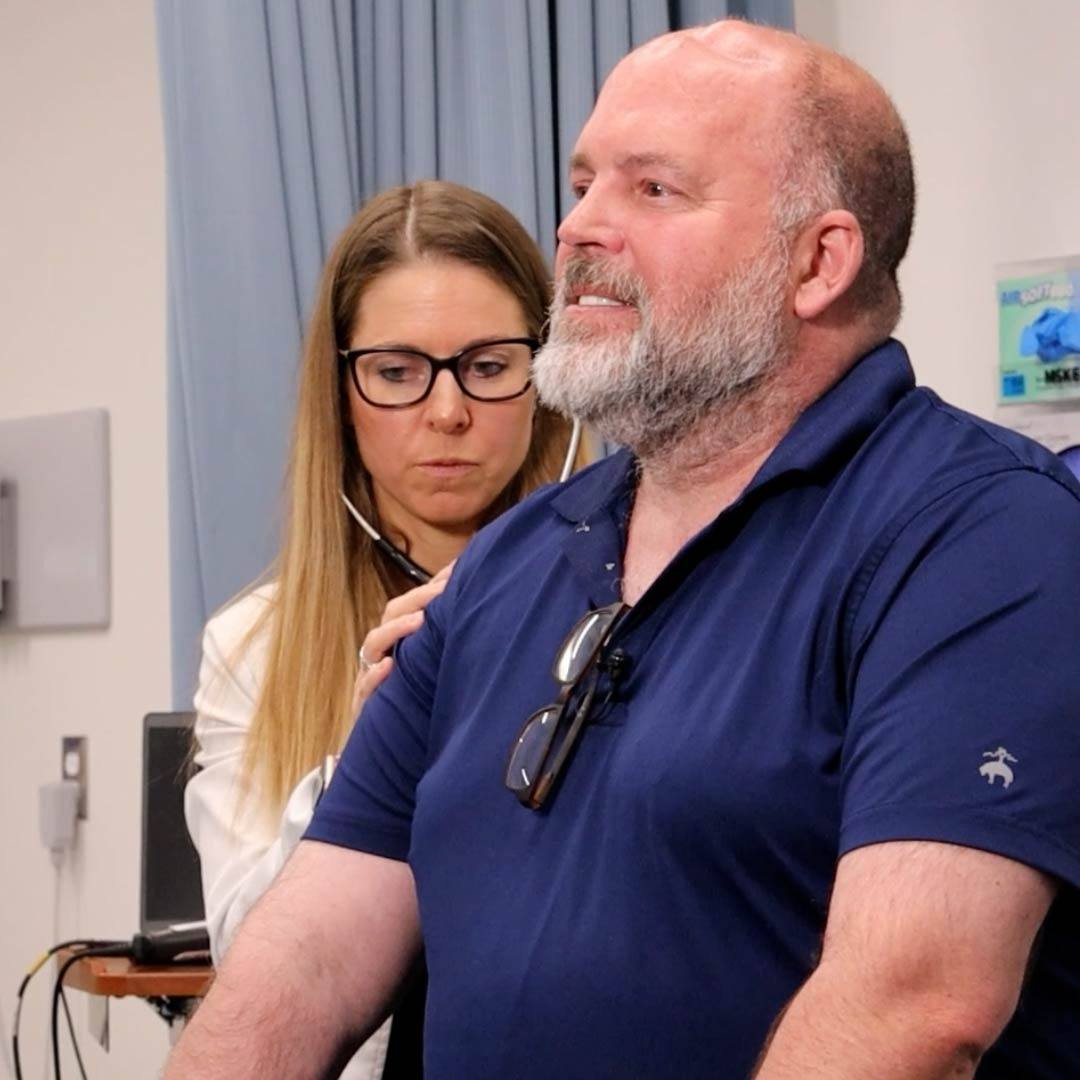 Travis McGinnis was just 30 years old when an insidious cancer was discovered in his brain. It had been growing there for some time, he says — his physicians estimated between five and 10 years. Had the stage-three oligoastrocytoma not been detected when it was, Travis would have likely lost his life. As it happened, thanks to care and treatment provided by neurologists and neurosurgeons at Mayo Clinic’s Rochester campus, the only solid thing the father of three lost to the cancer was a fist-sized piece of his brain.
Travis McGinnis was just 30 years old when an insidious cancer was discovered in his brain. It had been growing there for some time, he says — his physicians estimated between five and 10 years. Had the stage-three oligoastrocytoma not been detected when it was, Travis would have likely lost his life. As it happened, thanks to care and treatment provided by neurologists and neurosurgeons at Mayo Clinic’s Rochester campus, the only solid thing the father of three lost to the cancer was a fist-sized piece of his brain.
While having cancer was something he never wanted, Travis says the experience gave him insights and gifts he would not have otherwise realized: deep appreciation for his family and friends, gratitude for the present, and faith in strangers who generously supported him.
“Sometimes I’ll sit and think about everything I’ve been through, and it moves me to tears,” Travis says. “I’m alive and better for it. I wish I never would’ve had to go through it, but at least it wasn’t for nothing.”
Uncovering a startling diagnosis
In early 2014, Travis, a marketing professional, began experiencing strange episodes, later defined as seizures.
“I would get these tingly sensations in my head, like when your foot falls asleep,” Travis says. “I would also have these really bizarre thoughts about what was going on around me, what people were talking about me and thinking about me. But when the seizure was over, I couldn’t remember those thoughts.”
“The fact that people fly there from all over the world just speaks volumes about the level of care offered at Mayo.” Travis McGinnis
There was no pain or headaches with the seizures, but the third episode brought with it an interruption in his speech. When Travis told his wife, Kayleigh, what was happening, she urged him to seek answers. Travis scheduled a physical appointment with his primary care physician near his hometown of Sauk Rapids, Minnesota. Although the doctor’s initial diagnosis was that stress was to blame, an MRI was ordered.
“We did the MRI and found a tumor the size of a fist in the front left cortex of my brain,” Travis says, adding that the area where it was located controls speech and movement. “Based on the MRI pictures, it looked like a low-grade infiltrating glioma. But we wouldn’t know for sure until they did a biopsy. The doctor referred me to Mayo because I’m so young, and they’re so close.”
Turning to Mayo Clinic
That his neurosurgeon trusted Mayo Clinic to provide the caliber of care required to treat him was all the convincing Travis needed to schedule the appointment.
“The fact that people fly there from all over the world just speaks volumes about the level of care offered at Mayo,” he says.
In July, Travis met with a neurologist and neurosurgeon at Mayo Clinic. Within a month, he underwent surgery to remove the tumor. It was biopsied, and its true nature was discovered.
“My doctors said, ‘It’s not like a stage four, but it’s worse than we were hoping,’” Travis recalls of learning about the advanced-stage oligoastrocytoma. His surgeons were able to take out most of the tumor. But because these kinds of tumors have microscopic fingers that web throughout surrounding tissues, not all of the cancer could be removed. Travis returned home to recover from the effects of his surgery before proceeding with further treatment.
“I had trouble finding words and picking up and expressing complex thoughts with others. It took me a quite a while to get those skills back,” he says. “And my handwriting was atrocious.”
Processing the experience
A month and a half later, Travis traveled to Rochester to undergo six weeks of radiation therapy. While there, he stayed at Hope Lodge, a residence run by the American Cancer Society specifically for people receiving cancer treatment.
Each day, Monday through Friday, Travis spent 15 minutes receiving a dose of radiation. The remaining hours of the day Travis spent in routine, counting down the minutes until he could return home to his wife and daughters, who at the time were 10 years, 3 years and 6 months old.
“Sometimes I’ll sit and think about everything I’ve been through, and it moves me to tears. I’m alive and better for it. I wish I never would’ve had to go through it, but at least it wasn’t for nothing.” – Travis McGinnis
“I’d do a yoga workout in my room, go down for breakfast and chat with the other residents, grab a book and read in the library, or hang out with the others and have lunch,” Travis says. “My radiation was at 1:45 each day. After that I’d get a coffee and walk through downtown Rochester. When it was raining, I’d just walk the subway system. I’d go back to Hope Lodge and have dinner. They only had cable TV in the public areas, so it forced me to get out and mingle with the other guys.”
He also began journaling as a way to process the tumult of emotions stirred up by his diagnosis.
“Life just got flipped and turned upside down, essentially overnight, and writing helped me cope with those emotions by getting them on paper and organizing them,” Travis says, adding that he also published blog posts about his cancer journey on his company’s website.
Focusing on the positive
When his radiation treatments concluded in late October, Travis returned home to begin chemotherapy. Consisting of two different pills and infusion therapy, Travis’s chemo was managed remotely by his Mayo Clinic neurologist.
Since finishing chemotherapy, Travis returns to Mayo Clinic for follow-up MRIs that monitor the healing of his brain tissue and check for tumor re-growth. Although he initially required the test every three months, he was recently cleared to return in six months. Eventually, as long as the cancer’s growth stagnates, Travis’ MRI intervals will extend to a year.
“From what I’m told, the type of cancer I have won’t go into remission,” Travis says, adding that his only current therapy is precautionary daily anti-seizure medication to prevent potential issues caused by the hole in his brain.
Rather than dwelling on his losses, however, Travis focused his energies on what he’s gained. He’s turned his journal entries and blog posts into a self-published book called The Tale of a Fist-Sized Hole. Travis intends on donating 50 percent of the book’s royalties to Hope Lodge to show his appreciation for the time he spent there.
And he's looking to the future.
“In 20 years, I want people to say that Travis didn’t give up. That he didn’t let cancer get the best of him. That he fought and was happy and joyful and not down in the dumps and depressed because he has cancer,” he says.
HELPFUL LINKS
- Learn more about brain tumors and radiation therapy.
- Explore the Mayo Clinic Cancer Center.
- Read about clinical trials at Mayo Clinic.
- Connect with others talking about living with a brain tumor on Mayo Clinic Connect.
- Request an appointment.







